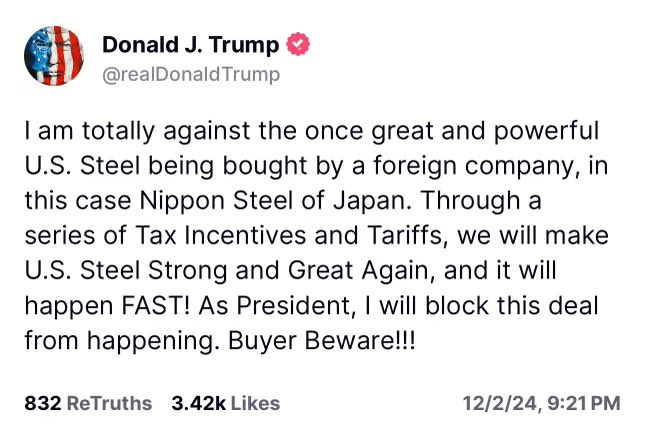Donald Trump’s vow to block the purchase of U.S. Steel by Japanese steelmaker Nippon Steel underscores a critical policy focus within the America First movement: prioritizing national economic sovereignty and strengthening domestic industries. His stance combines protectionist measures, economic nationalism, and strategic trade policies designed to fortify American manufacturing, particularly steel—a sector historically intertwined with U.S. industrial and military strength.
Trump posted on social media on Tuesday:


Context and Importance
The proposed acquisition by Nippon Steel has sparked a heated debate about the implications for American industry, labor, and national security. U.S. Steel, founded in 1901, has long symbolized the nation’s industrial might. For many within the America First movement, allowing a foreign corporation to acquire this iconic entity is seen as compromising not just economic stability but also sovereignty. Trump’s opposition reflects his broader approach to economic policy: defending domestic industries from foreign competition through tariffs, trade barriers, and strategic investment.
Trump’s pledge to use tax incentives and tariffs to rejuvenate U.S. Steel signals a commitment to reinvigorating domestic manufacturing. Protectionist policies, such as those proposed here, have historically garnered support from labor unions like the United Steelworkers. Despite differing political allegiances, these unions recognize the role tariffs and trade restrictions can play in sustaining jobs and communities reliant on industries like steel.
Implications for the America First Movement
- Economic Nationalism: Trump’s opposition aligns closely with the America First philosophy, emphasizing the importance of maintaining control over key industries. Steel production is not just an economic asset; it’s a strategic one. By blocking foreign acquisitions, the policy seeks to prevent potential vulnerabilities that could arise from foreign ownership of critical infrastructure.
- Job Preservation: The American steel industry has provided generations of workers with stable employment and upward mobility. Trump’s promise to block the deal resonates with workers concerned about layoffs and plant closures, even though Nippon Steel has pledged not to conduct layoffs or import competing steel slabs.
- National Security: Steel is integral to defense manufacturing, including tanks, ships, and other military hardware. Nippon Steel’s assurances notwithstanding, critics argue that foreign ownership could complicate the industry’s alignment with U.S. national security priorities.
- Political Leverage: Pennsylvania, a battleground state rich in steel heritage, is at the center of this debate. Trump’s opposition to the deal could bolster his standing among blue-collar voters in the state, many of whom supported him in 2016 and 2020.
- Revitalizing American Steel: Trump’s advocacy for tax incentives and tariffs as tools to protect U.S. Steel underscores a broader goal: ensuring that American manufacturers remain competitive globally. By discouraging foreign acquisitions and supporting domestic production, the policy aims to revitalize the industry while fostering economic independence.
Bipartisan Resonance
Notably, opposition to Nippon Steel’s acquisition transcends party lines. President Joe Biden and other Democrats have echoed concerns about foreign ownership of U.S. Steel, citing national security and economic stability. This rare bipartisan alignment underscores the symbolic and practical importance of U.S. Steel to the American political and economic landscape.
Challenges and Counterarguments
While Trump’s stance is consistent with the America First agenda, it faces opposition from proponents of free-market policies who argue that foreign investment can strengthen U.S. companies. Nippon Steel has promised substantial investments and safeguards for workers, leading some local officials and workers to support the deal. Critics also caution that excessive protectionism could provoke retaliatory trade measures from other nations.
Conclusion
Trump’s vow to block Nippon Steel’s purchase of U.S. Steel is more than a policy position; it’s a reaffirmation of the America First movement’s core principles. By prioritizing economic sovereignty, job preservation, and national security, Trump seeks to ensure that iconic American industries remain domestically controlled and competitive. This approach, while controversial, resonates with many Americans who view economic nationalism as essential to reclaiming the nation’s industrial heritage and securing its future. Whether this stance will translate into tangible economic gains or provoke unintended consequences remains a pivotal question for policymakers and voters alike.
Watch for more details:
